Top Rankings
Wilson County Schools School District ranks among the top 20% of public school district in North Carolina for:
Category
Attribute
Diversity
Most diverse schools (Top 1%)
Community Size
Largest student body (number of students) (Top 1%)
For the 2025 school year, there are 3 public preschools serving 1,400 students in Wilson County Schools School District. This district's average pre testing ranking is 6/10, which is in the top 50% of public pre schools in North Carolina.
Public Preschools in Wilson County Schools School District have an average math proficiency score of 52% (versus the North Carolina public pre school average of 51%), and reading proficiency score of 45% (versus the 46% statewide average).
Minority enrollment is 79% of the student body (majority Black), which is more than the North Carolina public preschool average of 59% (majority Black and Hispanic).
Overview
This School District
This State (NC)
# Schools
25 Schools
994 Schools
# Students
10,216 Students
464,055 Students
# Teachers
614 Teachers
33,275 Teachers
Student : Teacher Ratio
17:1
17:1
District Rank
Wilson County Schools School District, which is ranked within the bottom 50% of all 320 school districts in North Carolina (based off of combined math and reading proficiency testing data) for the 2021-2022 school year.
The school district's graduation rate of 79% has increased from 76% over five school years.
Overall District Rank
#175 out of 325 school districts
(Bottom 50%)
(Bottom 50%)
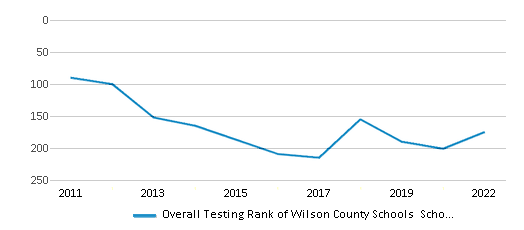
Math Test Scores (% Proficient)
47%
51%
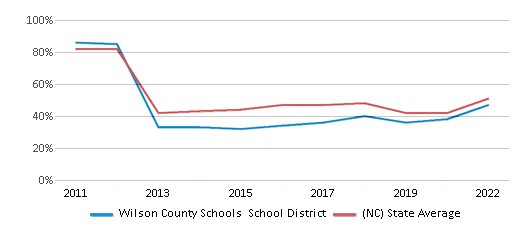
Reading/Language Arts Test Scores (% Proficient)
48%
50%
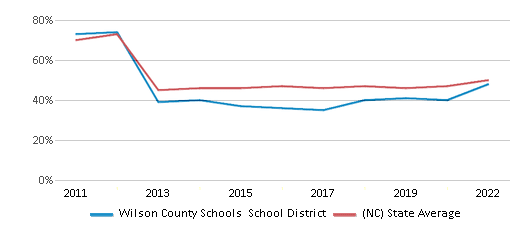
Science Test Scores (% Proficient)
60%
63%
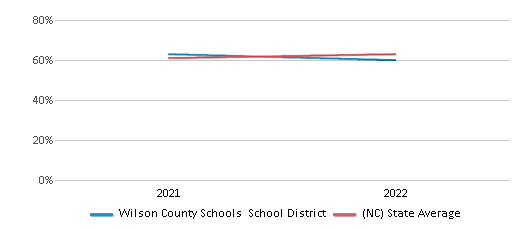
Graduation Rate
79%
86%
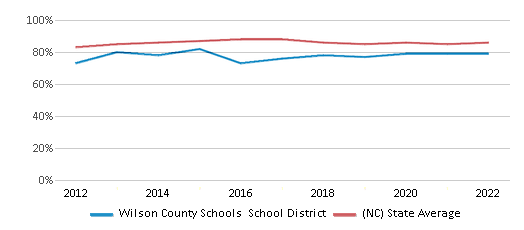
Students by Ethnicity:
Diversity Score
0.69
0.72
# American Indian Students
22 Students
6,572 Students
% American Indian Students
n/a
1%
# Asian Students
151 Students
18,458 Students
% Asian Students
1%
4%
# Hispanic Students
2,468 Students
105,943 Students
% Hispanic Students
24%
23%
# Black Students
4,303 Students
114,509 Students
% Black Students
42%
25%
# White Students
2,834 Students
189,147 Students
% White Students
28%
41%
# Hawaiian Students
12 Students
648 Students
% Hawaiian Students
n/a
n/a
# Two or more races Students
470 Students
28,778 Students
% of Two or more races Students
5%
6%
Students by Grade:
# Students in PK Grade:
137
23,104
# Students in K Grade:
777
72,144
# Students in 1st Grade:
787
74,289
# Students in 2nd Grade:
841
75,942
# Students in 3rd Grade:
698
68,925
# Students in 4th Grade:
714
69,686
# Students in 5th Grade:
695
66,668
# Students in 6th Grade:
770
5,021
# Students in 7th Grade:
766
3,684
# Students in 8th Grade:
732
3,629
# Students in 9th Grade:
1,030
214
# Students in 10th Grade:
847
194
# Students in 11th Grade:
771
187
# Students in 12th Grade:
651
368
# Ungraded Students:
-
-
District Revenue and Spending
The revenue/student of $11,920 is higher than the state median of $11,187. The school district revenue/student has stayed relatively flat over four school years.
The school district's spending/student of $11,236 is less than the state median of $11,612. The school district spending/student has stayed relatively flat over four school years.
Total Revenue
$122 MM
$17,307 MM
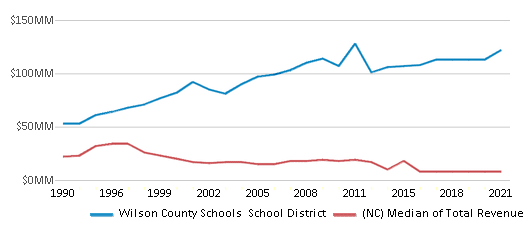
Spending
$115 MM
$17,964 MM
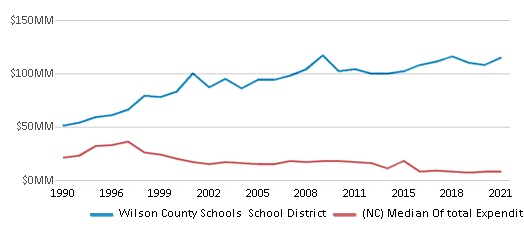
Revenue / Student
$11,920
$11,187
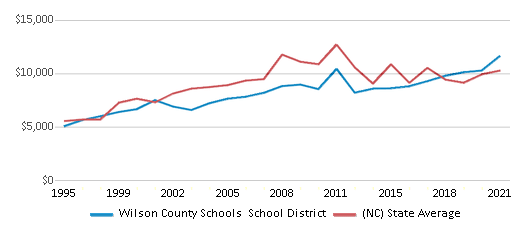
Spending / Student
$11,236
$11,612
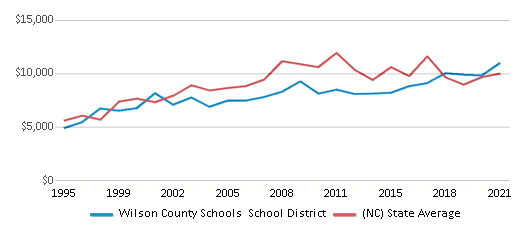
Best Wilson County Schools School District Public Preschools (2025)
School
(Math and Reading Proficiency)
(Math and Reading Proficiency)
Location
Grades
Students
Rank: #11.
Lucama Elementary School
(Math: 80-84% | Reading: 65-69%)
Rank:
Rank:
10/
Top 10%10
6260 Blalock Road
Lucama, NC 27851
(252) 239-1257
Lucama, NC 27851
(252) 239-1257
Grades: PK-5
| 373 students
Rank: #22.
John W Jones Elementary School
(Math: 45% | Reading: 42%)
Rank:
Rank:
4/
Bottom 50%10
4028 Highway 42 West
Wilson, NC 27893
(252) 265-4020
Wilson, NC 27893
(252) 265-4020
Grades: PK-5
| 584 students
Rank: #33.
Margaret Hearne Elementary School
(Math: 30-34% | Reading: 25-29%)
Rank:
Rank:
2/
Bottom 50%10
300 W Gold St
Wilson, NC 27893
(252) 399-7925
Wilson, NC 27893
(252) 399-7925
Grades: PK-5
| 443 students
Recent Articles

What Is A Charter School?
Explore the world of charter schools in this comprehensive guide. Learn about their history, how they operate, and the pros and cons of this educational innovation. Discover key facts about charter schools, including admission policies, demographics, and funding, as well as what to look for when considering a charter school for your child.

10 Reasons Why High School Sports Benefit Students
Discover the 10 compelling reasons why high school sports are beneficial for students. This comprehensive article explores how athletics enhance academic performance, foster personal growth, and develop crucial life skills. From improved fitness and time management to leadership development and community representation, learn why participating in high school sports can be a game-changer for students' overall success and well-being.

February 05, 2025
Understanding the U.S. Department of Education: Structure, Impact, and EvolutionWe explore how the Department of Education shapes American education, from its cabinet-level leadership to its impact on millions of students, written for general audiences seeking clarity on this vital institution.





